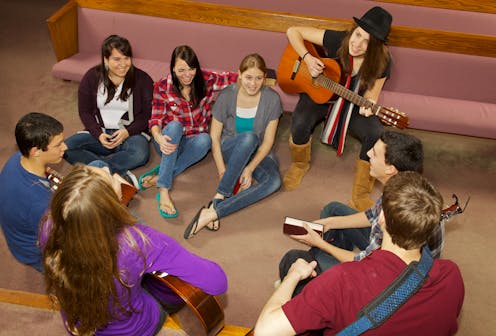Why do religious teens engage in less risky behavior? A psychologist explains
- Written by James A. Shepperd, Professor of Psychology, University of Florida

Researchers have long known that religious teens are less likely to engage in risky behavior[1]. My team’s research explains why.
We surveyed multiple times the religious beliefs and risk behavior of over 1,400 teens from Florida between 2010 and 2012. Although the majority of our sample self-identified as Christian, many of the teens identified as belonging to other religious groups or as nonreligious.
Our work[2] has focused on risky behaviors – such as using alcohol, drugs and tobacco – that are socially unacceptable, potentially harmful and often illegal for teens.
What deters risky behavior
We identified four conditions that can reduce risky behavior: low opportunity, appeal, acceptability and a high level of self-control.
Take drinking alcohol, as an example. Teens are less likely to drink if they lack opportunities[3] or if they view drinking to be unappealing[4], perhaps because the people who are important to them view drinking unfavorably[5]. Teens are also less likely to drink alcohol if they find drinking to be morally unacceptable[6]. Finally, teens are less likely to drink if they can control their impulses[7] and resist the temptation or peer pressure[8].
These four conditions overlap. For example, peer disapproval can reduce both the appeal[9] and the moral acceptability[10] of using alcohol. In addition, circumstances such as parent supervision that limit opportunity may also communicate that the behavior is morally unacceptable or unappealing.
What religion offers
Although religions differ in their beliefs, they all share three features that can affect the four conditions that deter risky behavior.
First, all religions offer people a worldview[11], which is a set of beliefs that addresses questions such as why people exist, how they should behave and what happens after they die.
Worldviews provide guidelines that can influence the appeal and moral acceptability of risky behavior. My research team found that religious teens – that is, teens who express stronger religious beliefs and display more frequent religious behavior[12] – possess a stronger sense of meaning and a clear understanding of what is right versus wrong[13]. These benefits of a worldview were also linked to lower rates of smoking, drinking and marijuana use.
Second, religions often revolve around belief in an omniscient entity or God that monitors and can punish or reward behavior. Belief in God, in turn, can promote self-monitoring, self-control and ultimately less risky behavior[14].
Third, religions are not just a set of beliefs; they represent communities of people who can influence thought and behavior. They can limit opportunities to engage[16] in risky behavior. They can convey values[17], such as the idea that using alcohol is wrong, that influence the appeal and moral acceptability of risky behavior. And they can offer support and feelings of belongingness[18] that can help youth with impulse control.
What remains unknown
Most research exploring the effects of religion on risk behavior examines Christians in the U.S. and Europe. We need more research from other cultures and other religions. It is noteworthy that our research suggests that the link between greater religiousness and less risky behavior is generally the same for boys and girls and across religious and racial groups[19].
Research suggests that a sense of meaning and clear understanding of what is right and wrong is linked to engaging in less risky behavior even among nonreligious teens[20]. Our interpretation is that having a strong worldview matters more than the source of the worldview.
In addition, secular communities lack belief in an all-powerful God. But the larger point is that monitoring and rewards from authority figures can influence risky behavior[21]. Secular communities may be able to reduce risky behavior in teens through greater monitoring and rewards and by adapting the other features of religion that appear to deter risky behavior in religious adolescents.
The Research Brief[22] is a short take on interesting academic work.
References
- ^ risky behavior (doi.org)
- ^ Our work (doi.org)
- ^ lack opportunities (doi.org)
- ^ view drinking to be unappealing (doi.org)
- ^ view drinking unfavorably (doi.org)
- ^ morally unacceptable (doi.org)
- ^ control their impulses (doi.org)
- ^ peer pressure (doi.org)
- ^ reduce both the appeal (doi.org)
- ^ moral acceptability (doi.org)
- ^ offer people a worldview (doi.org)
- ^ stronger religious beliefs and display more frequent religious behavior (doi.org)
- ^ sense of meaning and a clear understanding of what is right versus wrong (doi.org)
- ^ self-monitoring, self-control and ultimately less risky behavior (doi.org)
- ^ Jeffrey Greenberg/Universal Images Group via Getty Images (www.gettyimages.com)
- ^ opportunities to engage (doi.org)
- ^ convey values (doi.org)
- ^ support and feelings of belongingness (doi.org)
- ^ the same for boys and girls and across religious and racial groups (doi.org)
- ^ even among nonreligious teens (doi.org)
- ^ from authority figures can influence risky behavior (doi.org)
- ^ Research Brief (theconversation.com)
Authors: James A. Shepperd, Professor of Psychology, University of Florida

